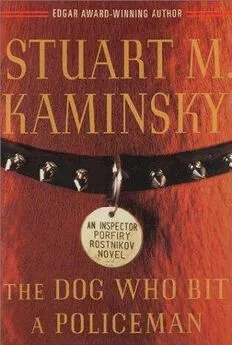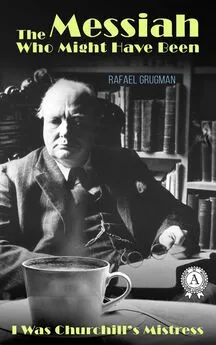Stuart Kaminsky - The Dog Who Bit a Policeman
- Название:The Dog Who Bit a Policeman
- Автор:
- Жанр:
- Издательство:неизвестно
- Год:неизвестен
- ISBN:нет данных
- Рейтинг:
- Избранное:Добавить в избранное
-
Отзывы:
-
Ваша оценка:
Stuart Kaminsky - The Dog Who Bit a Policeman краткое содержание
The Dog Who Bit a Policeman - читать онлайн бесплатно полную версию (весь текст целиком)
Интервал:
Закладка:
Sasha was just past thirty but looked at least five years younger, in spite of his growing problems with his wife, Maya, and the pris-onlike condition of living in a tiny two-room apartment with two children. Making the situation worse was the neurotic intrusion of his mother, Lydia, who appeared whenever she wished, shouted her directives for proper living and child rearing, and was constantly on the verge of battle with Maya. Younger men were being promoted ahead of Sasha, who was considered part of the old guard in spite of his age. Sasha was seldom in a good mood, but he was feeling rather content tonight.
Elena, on the other hand, was a few years older than Sasha. She was being pursued by Iosef Rostnikov, Inspector Rostnikov’s son, who had recently joined the Office of Special Investigation. Iosef was smart, handsome, and, in spite of being considered Jewish, looking toward a promising future. Iosef had proposed marriage to Elena three times in the last few months. She had turned him down each time. She had a career and ambition, and she did not want to come home each night to anything but the emotions she had
earned during the day. Still, Iosef was wearing her down, which was not entirely an unpleasant experience.
When they got the assignment from Chief Inspector Porfiry Petrovich Rostnikov, with a warning to be especially careful, Sasha had told Maya that he would be away for several days on a dangerous assignment. Maya didn’t look convinced, but she accepted the situation after getting a call from Porfiry Petrovich telling her that, indeed, her husband had been selected by Yaklovev himself for the job, a job he was not at liberty to discuss.
Elena, on the other hand, had had little trouble after telling her aunt Anna that she would be away on assignment for a while. Elena lived in a small, one-bedroom apartment with her aunt, who’d been a state procurator until a series of heart attacks had sent her into retirement. Recently, Anna and her niece had been finding it difficult to make ends meet. Anna’s pension money had not come in for months, and Elena’s salary, not particularly high, had arrived later and later each month. The two women had lived increasingly on Anna’s small savings.
It was the Yak’s idea that Sasha and Elena engage in this role playing. It was the Yak who had arranged for Sasha to have both a pocket full of American dollars and two credit cards in the name of Dmitri Kolk. The investment seemed out of proportion to the crime, but the Yak was not to be questioned. Besides, Sasha thought, it was a respite, a small if possibly dangerous vacation with enormous benefits.
“How do I look?” Sasha asked Elena when they were back in the hotel room and he had changed clothes.
Elena examined him. Sasha had daubed more hair cream into his hair and combed it straight back. He had changed out of his designer suit and was now wearing gray slacks, a blue button-down shirt, and a gray silk zipper jacket.
“Fine,” she said. “You saw the dog?”
“A pit bull,” he said. “Kennel has several of them. This one is supposedly particularly mean, but he looked quite benign to me. I hate dogs. My aunt had a dog. He growled and snapped at me and my cousins. Twice he bit me. I dreaded visiting my aunt. When the dog, Osip, died, my cousins and I celebrated. This pit bull is named Tchaikovsky. He was shipped to Kiev and then shipped here to me.
He’s in a private, very expensive kennel. You should have come to see him.”
“I prefer cats,” said Elena, more than a bit irked but not showing it. She had never been offered the opportunity to examine the animal upon whose performance their safety and the success of their assignment depended. “It’s almost midnight.”
Sasha nodded, adjusted his shirt and sleeves, and checked his hair with the palm of his right hand. “I’d better hurry,” he said.
“I still think I should go with you,” she said.
“The invitation was for me,” he said.
“I can follow, watch,” she said.
“Unnecessarily dangerous,” he said.
“You look pleased. You’ve looked pleased about this whole assignment.”
“Perhaps, a little,” he said.
“You’re not curious about why so much money is being spent to put on a front for us-hotel, clothes, shipping a dog to Kiev and back, bets you’ll have to make?” she asked.
“No,” he said. “That is the concern of Director Yaklovev.”
“Be careful,” she said.
“Of course,” he said, checking himself again in the mirror.
Elena wasn’t so sure.
“You have the address where they told me to come,” he said, adjusting his hair. “If I am not back by morning. .”
“Then I’ll know you are really enjoying yourself,” she said.
The naked, rather hairy body of a large man floated facedown in the Moscow River. His massive buttocks rose and bobbed like twin pale balloons. The body was corpse white and bore a tattoo on the left arm which, like the right, drifted outward from the dead man.
The tattoo, Rostnikov could see from the police boat, was of a knife with a snake twisted around the blade and handle.
“Shall we pull him out?” asked a uniformed officer.
“No, not yet,” said Rostnikov. “We’ll wait. You have coffee?”
The uniformed officer, a very young man with a cap that looked a bit large for his narrow face, said yes.
“Please,” said Rostnikov, sitting on the wooden seat at the rear of the boat. “What is your name?”
“Igor Druzhnin.”
“Bring a cup for yourself, too, Igor Druzhnin,” said Rostnikov.
“We can talk while we wait.”
The young officer left.
An excursion boat, filled no doubt with tourists, chugged past.
One or two people on board saw the body and began to take pictures. Others joined them.
In English, one of the tourists said, “Can’t we get a little closer?”
The boat cruised on down the river.
Once, the river had been relatively clean, a wide, dark, flowing, meandering path which Muscovites liked to watch from the banks while fishing, eating lunch, or simply thinking. But that was gradually changing. There had always been those who under cover of night dumped their garbage in the dark water. Now, though such dumping was illegal, it had grown less covert. And garbage was only part of the problem. Far north, factories poured liquid waste into the river. Much of it was filtered out by natural processes. Much of it was not.
“Others do it. So, I do it too,” was the often-spoken excuse of those who lived near enough to the river to defile it.
It had grown worse with the fall of the Soviet Union and the chaos that had overrun the city. The police, in the days before the new democracy, would from time to time arrest people who spread filth in the waters. Now no one seemed to care.
There were those who said the river had taken on a new and not pleasant smell.
“It has the stink of freedom,” Lydia Tkach had said.
Porfiry Petrovich Rostnikov was the senior investigator in the Office of Special Investigation. This office had been started as a dumping ground for politically touchy cases and cases the MVD
and even State Security, the old KGB, wanted no part of because they promised nothing but failure and a threat to those who might pursue them.
Rostnikov and his staff had been brought to the Office of Special Investigation by the pompous Colonel Snitkonoy, the Gray Wolfhound, who was considered a fine figure of a fool on whom could be dumped disastrous cases without the possibility of furthering his ambition.
They had been wrong. When Rostnikov had been transferred from the Moscow Procurator’s Office after one confrontation too many with people in power-the KGB and the chief procurator himself-he had taken with him his small staff. The sensitive crimes that others had imposed upon the Wolfhound and his staff began to be brought to conclusions, and at one point the Office of Special Investigation had even stopped an attempted assassination of Mikhail Gorbachev, who was then president of the Soviet Union. There were those later who said that it would have been better had Rostnikov failed, but at the time it had brought grudg-ing respect for Snitkonoy and his men.
So successful was the office that the Gray Wolfhound was transferred and promoted to head the security service at the Hermitage Museum in St. Petersburg. He was a perfect choice in his neat, be-medaled uniform, a relic standing tall with flowing silver hair, an exhibit worthy of placement next to a Rublyov icon.
The Office of Special Investigation had recently been taken over by Igor Yaklovev. The Yak was about fifty, lean, with hair cut short and the bushiest eyebrows Porfiry Petrovich had ever seen, with the possible exception of Leonid Brezhnev. The Yak, a former KGB officer, was given to dark, uneventful suits and suspenders. His hair was receding and his glasses had thick lenses. He was ambitious, Rostnikov knew, and was using the office to further that ambition.
Information gathered in the course of investigations could and well might be used by the Yak to put pressure on those above him, or traded to them to aid his ascension of the ladder of political power.
But to give the man his due, Yaklovev had promoted Rostnikov, given him a free hand, and pledged his support if one or more of the varied criminal organizations and the confused state bureaucracy attempted to impede the performance of his duties. Up to now, the Yak had been as good as his word and had successfully bought the loyalty of Rostnikov and his staff.
The wake of the passing excursion boat, now about a half mile down the river, had lifted the corpse and set his right hand moving in what looked like a wave to a school of small fish below him.
The boat was on the northern bank of the meandering river, directly across from the Hotel Baltschug Kempinski Moskau. An elegant hotel built in 1898 and reopened in 1992 after a complete renovation by a German-Russian group, the hotel boasted 234 luxury rooms. Rostnikov knew that on the other side of the hotel was St. Basil’s Cathedral, Red Square, and the Kremlin.
Rostnikov shifted his weight as the young uniformed officer came back on deck and offered the detective a blue mug. Officer Druzhnin had a gray cup. Rostnikov took the cup, thanked the man who looked out at the corpse, and began to drink. The coffee was tepid and awful, but it was coffee.
As he drank, the two men watched the naked corpse.
“Are you married, Igor?”
“Yes.”
“Children?”
“Not yet.”
“You want children?”
“Yes, but we can’t afford even to feed ourselves. I haven’t been paid for two months. Fortunately, my wife works. She sells papers and sweets at the Kazan train station.”
Rostnikov could never quite get comfortable. He was a man of average size but built like the German tank that had crippled his left leg when he was a boy soldier. For almost half a century, Rostnikov had dragged the leg painfully, had listened to its complaints like those of an aged parent for whom one is responsible. Then, one day, the pain had gotten worse and a doctor he trusted, his wife Sarah’s cousin, Leon Moiseyevitch, had told him that the leg should go. Rostnikov had agreed with regret, and now he had a prosthesis that allowed him to walk almost normally. Rostnikov missed his withered leg and knew that Paulinin, the half-mad sci-entific technician whose laboratory was two levels below the Petrovka Police Headquarters, had kept that leg somewhere among the hundreds of specimens that cluttered his laboratory.
Rostnikov had sent for Paulinin. Paulinin would certainly grumble and complain. He didn’t like leaving his laboratory. If there was a corpse to be examined, he wanted it brought to him. If there was evidence to be pieced together, Paulinin wanted it laid out at his convenience among the retorts, burners, and tools, many of which were his own inventions.
Читать дальшеИнтервал:
Закладка:










